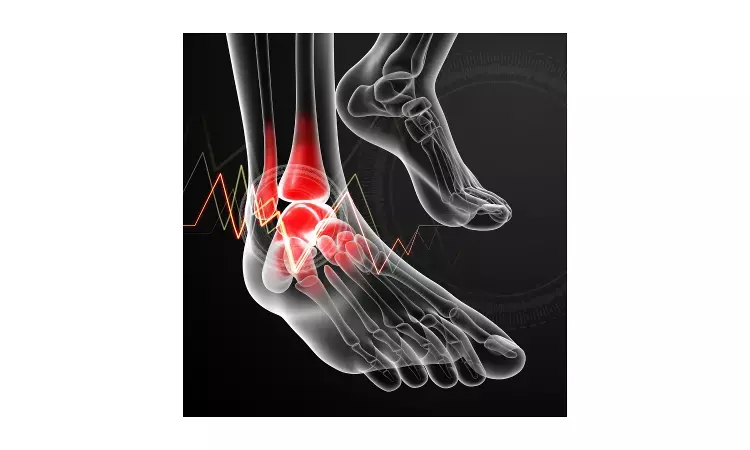- Home
- Medical news & Guidelines
- Anesthesiology
- Cardiology and CTVS
- Critical Care
- Dentistry
- Dermatology
- Diabetes and Endocrinology
- ENT
- Gastroenterology
- Medicine
- Nephrology
- Neurology
- Obstretics-Gynaecology
- Oncology
- Ophthalmology
- Orthopaedics
- Pediatrics-Neonatology
- Psychiatry
- Pulmonology
- Radiology
- Surgery
- Urology
- Laboratory Medicine
- Diet
- Nursing
- Paramedical
- Physiotherapy
- Health news
- Fact Check
- Bone Health Fact Check
- Brain Health Fact Check
- Cancer Related Fact Check
- Child Care Fact Check
- Dental and oral health fact check
- Diabetes and metabolic health fact check
- Diet and Nutrition Fact Check
- Eye and ENT Care Fact Check
- Fitness fact check
- Gut health fact check
- Heart health fact check
- Kidney health fact check
- Medical education fact check
- Men's health fact check
- Respiratory fact check
- Skin and hair care fact check
- Vaccine and Immunization fact check
- Women's health fact check
- AYUSH
- State News
- Andaman and Nicobar Islands
- Andhra Pradesh
- Arunachal Pradesh
- Assam
- Bihar
- Chandigarh
- Chattisgarh
- Dadra and Nagar Haveli
- Daman and Diu
- Delhi
- Goa
- Gujarat
- Haryana
- Himachal Pradesh
- Jammu & Kashmir
- Jharkhand
- Karnataka
- Kerala
- Ladakh
- Lakshadweep
- Madhya Pradesh
- Maharashtra
- Manipur
- Meghalaya
- Mizoram
- Nagaland
- Odisha
- Puducherry
- Punjab
- Rajasthan
- Sikkim
- Tamil Nadu
- Telangana
- Tripura
- Uttar Pradesh
- Uttrakhand
- West Bengal
- Medical Education
- Industry
Platelet rich plasma not effective method to treat ankle arthritis: Study

Pain is the most common symptom of ankle arthritis, but other symptoms also need attention that can lead to better treatment and management. Few effective nonsurgical interventions exist, but platelet-rich plasma (PRP) injections are widely used, with some evidence of efficacy in knee osteoarthritis.
A randomized study by Liam D. A. Paget, MD and team has revealed that intra-articular platelet-rich plasma injections, did not significantly improve ankle symptoms and function over 26 weeks compared to placebo.The results of the study did not support the use of platelet-rich plasma injections for ankle osteoarthritis.
The findings of the study are published in JAMA Network.
The objective of the study was to determine the effect of PRP injections on symptoms and function in patients with ankle osteoarthritis.
The study was a multicenter, block-randomized, double-blinded, placebo-controlled clinical trial performed at 6 sites in the Netherlands .The study was conducted from August 2018, to December 2020. Patients were randomly assigned to receive 2 ultrasonography-guided intra-articular injections of either PRP (n = 48) or placebo (saline; n = 52). The primary outcome was the validated American Orthopaedic Foot and Ankle Society score (range, 0-100; higher scores indicate less pain and better function; minimal clinically important difference, 12 points) over 26 weeks.
The results of the study were
• A total of 100 randomized patients (mean age, 56 years; 45 [45%] women), no patients were lost to follow-up for the primary outcome.
• Compared with baseline values, the mean American Orthopaedic Foot and Ankle Society score improved by 10 points in the PRP group and 11 points in the placebo group.
• The adjusted between-group difference over 26 weeks was −1 ([95% CI, –6 to 3]; P = .56).
• One serious adverse event was reported in the placebo group, which was unrelated to the intervention; there were 13 other adverse events in the PRP group and 8 in the placebo group.
Paget, and team concluded that "Among patients with ankle osteoarthritis, intra-articular PRP injections, compared with placebo injections, did not significantly improve ankle symptoms and function over 26 weeks. The results of this study do not support the use of PRP injections for ankle osteoarthritis."
Reference:
Paget LDA, Reurink G, de Vos R, et al. Effect of Platelet-Rich Plasma Injections vs Placebo on Ankle Symptoms and Function in Patients With Ankle Osteoarthritis: A Randomized Clinical Trial. JAMA. 2021;326(16):1595–1605. doi:10.1001/jama.2021.16602
Medical Dialogues consists of a team of passionate medical/scientific writers, led by doctors and healthcare researchers. Our team efforts to bring you updated and timely news about the important happenings of the medical and healthcare sector. Our editorial team can be reached at editorial@medicaldialogues.in.
Dr Kamal Kant Kohli-MBBS, DTCD- a chest specialist with more than 30 years of practice and a flair for writing clinical articles, Dr Kamal Kant Kohli joined Medical Dialogues as a Chief Editor of Medical News. Besides writing articles, as an editor, he proofreads and verifies all the medical content published on Medical Dialogues including those coming from journals, studies,medical conferences,guidelines etc. Email: drkohli@medicaldialogues.in. Contact no. 011-43720751


